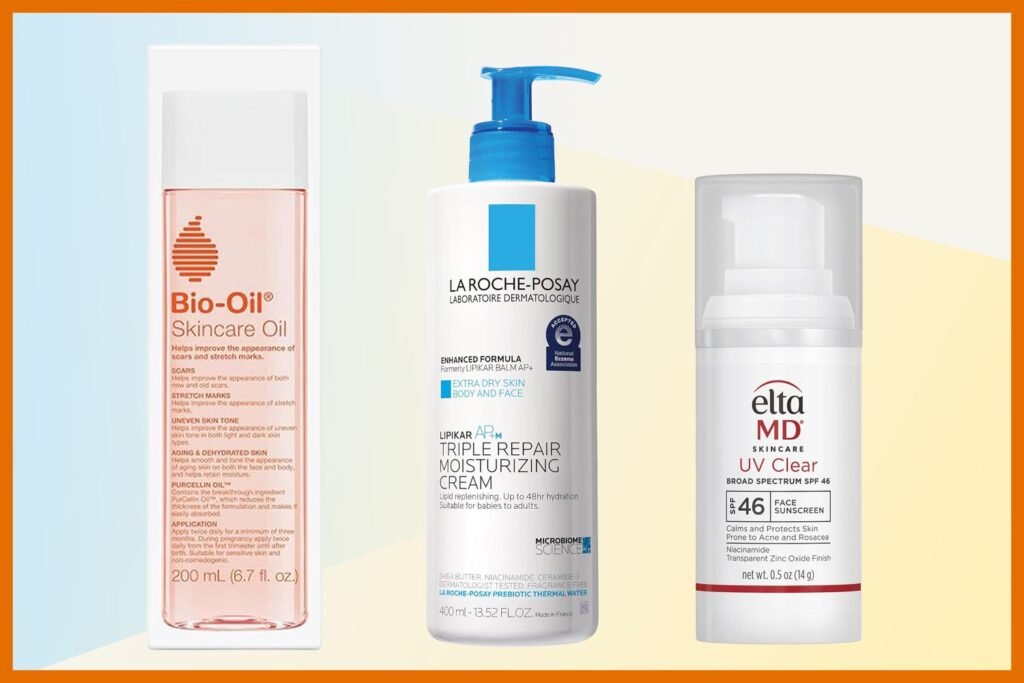The Essential Guide to Pregnancy-Safe Skincare
Navigating skincare during pregnancy can feel daunting, especially when hormonal changes bring on new concerns like hyperpigmentation and breakouts. This guide will help you simplify your skincare routine while ensuring you choose safe and effective products for both you and your baby.
Understanding Changes in Your Skin During Pregnancy
Pregnancy brings about significant hormonal changes that can impact your skin. According to OB-GYN Gunvor Ekman-Ordeberg, MD, PhD, these changes can lead to various conditions such as:
- Hyperpigmentation: Often referred to as "pregnancy mask" or melasma, characterized by dark patches on the skin.
- Acne Breakouts: Increased oil production can lead to more frequent breakouts.
- Dryness and Sensitivity: Hormonal fluctuations can lead to dry and reactive skin.
- Stretch Marks: Rapid skin stretching can result in stretch marks as your body changes.
To address these issues, it’s crucial to select skincare products that are safe during pregnancy.
Key Ingredients to Avoid
When selecting skincare, be mindful of ingredients that could pose risks:
-
Retinoids: This includes retinol and prescription versions like tretinoin. Classified as FDA Category X, retinoids have a known risk of causing birth defects (source).
-
Salicylic Acid: While some mild forms can be used, high concentrations should be avoided. Consult your dermatologist for suitable options.
-
Fragrance: Fragrances can trigger morning sickness and allergies. Avoid products with artificial scents and opt for fragrance-free alternatives.
-
Parabens: These preservatives may disrupt hormonal balance; hence, look for paraben-free formulations.
- Hydroquinone: Commonly used for skin lightening, it’s advised to limit this during pregnancy due to absorption concerns.
Recommended Skincare Ingredients
While the list of ingredients to avoid is long, several components are deemed safe and beneficial:
-
Hyaluronic Acid: A great hydrator that attracts moisture and strengthens the skin barrier, making it an excellent choice for dry skin during pregnancy.
-
Vitamin C: This antioxidant helps combat hyperpigmentation without the risks associated with retinoids. Nonetheless, pay attention to formulations, as some may irritate sensitive skin.
- Glycerin: A powerful humectant that draws moisture to the skin, keeping it hydrated and healthy.
Why You Should Consider Hyaluronic Acid
Hyaluronic Acid is a star ingredient recommended by dermatologists for its ability to retain moisture. As Dr. Anate Brauer points out, this naturally occurring substance doesn’t deeply penetrate the skin, posing no risks to the fetus. It’s available in various forms—cleansers, serums, and creams—making it easy to incorporate into your routine.
Effective Products for Your Skincare Routine
Gentle Cleansers
Opt for mild, hypoallergenic cleansers that won’t strip natural oils. Here’s a notable pick:
- Vanicream Gentle Facial Cleanser: This soap-free formula is excellent for sensitive skin, free of fragrances and other irritants.
Moisturizers
Hydration is key to tackling dryness during pregnancy:
-
CeraVe Hydrating Body Wash: This non-drying, fragrance-free body wash is loaded with ceramides to lock in moisture.
- Tula 24-7 Moisture Hydrating Cream: Offers hydration with probiotics and antioxidants, making it perfect for day and night use, though it does contain some fragrance.
Targeting Specific Concerns
For melasma or excessive dryness, consider:
-
RoC Multi Correxion Revive & Glow Daily Serum: Contains vitamin C and is paraben-free, designed to help brighten and even out skin tone.
- Naturium Azelaic Acid 10%: Effective for treating acne and melasma while being safe for pregnancy.
Sun Protection
Don’t skip the sunscreen:
- EltaMD UV Clear Broad-Spectrum SPF 46: A non-comedogenic sunscreen that protects against UV damage without clogging pores.
Common Skincare Concerns During Pregnancy
Dryness and Irritation
- Strategies: Use products rich in hyaluronic acid and glycerin, and apply a nourishing moisturizer regularly.
Increased Breakouts
- Solutions: Gentle cleansers and non-comedogenic products are essential. Consistently check with a dermatologist for tailored advice.
Stretch Marks
- Prevention Tips: While it’s difficult to avoid stretch marks completely, moisturizing oils like Bio-Oil can help maintain skin elasticity.
Conclusion
Creating a pregnancy-safe skincare routine is crucial for your comfort and confidence during this transformative time. By selecting products with safe ingredients and consulting with healthcare providers, you can ensure your skincare regime supports your skin’s changing needs.
For a thorough list of pregnancy-safe skincare products and expert recommendations, always consult your dermatologist as well as your OB-GYN. Remember, simplicity is key; find what works for you and stick with it.


